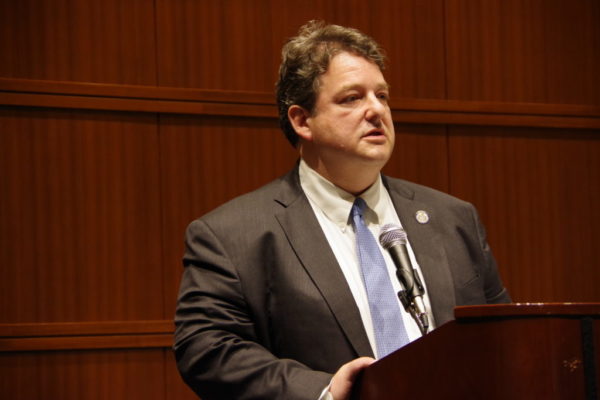
A half-dozen bills are set to hit the floor of the Virginia House of Delegates in January that were inspired by the poor conditions at the Serrano Apartments and other Virginia affordable housing properties.
After residents exposed poor living conditions at the Columbia Pike apartment complex, Del. Alfonso Lopez (D-49) tells ARLnow he began drafting bills to strengthen tenant rights and improve living conditions in affordable housing properties across the Commonwealth.
“I believe no one should have to go through what the folks at the Serrano went through,” said Lopez, whose district includes the Serrano, owned by affordable housing developer AHC Inc., as well a dozen other properties owned by AHC and other local developers.
Since residents and advocates came forward in an ARLnow article published in May, AHC has committed to making changes under the eye of the Arlington County Board, undertaking repairs, installing new leadership, adding communication channels and establishing a claims process for damaged belongings.
Lopez is proposing the following bills to protect tenants with livability grievances against their landlords:
- Include “bare minimum livable standards” in the Virginia Uniform Statewide Building Code
- Extend the period of time eligible for rent reimbursement for condemned properties
- Strengthen the prohibition against retaliatory evictions by landlords
- Institute a “warranty of habitability” clause that tenants can enforce against landlords whose properties don’t meet living basic standards
These are also four changes that former ARLnow opinion columnist Nicole Merlene called for after the conditions at the Serrano garnered widespread attention.
“I’m appreciative that Del. Lopez has been working with local stakeholders to ensure that tenants living in aging buildings will have enhanced rights moving forward,” Merlene, who co-chairs Arlington’s Tenant-Landlord Commission, tells ARLnow.
Lopez has pre-filed these and two bills unrelated to the Serrano. After they’re drafted by attorneys with the Virginia Division of Legislative Services, he’ll introduce them to the House of Delegates during the upcoming two-month General Assembly session, which begins in mid-January.
The first bill would make it easier and cheaper for residents to substantiate in court that their dwelling is unlivable. With “bare minimum” livable standards only found in the Virginia Residential Landlord and Tenant Act, tenants must hire professional experts to testify on their behalf, Lopez says.
“If these basic standards were in the code, a county inspector would be able to file an abatement order and write a letter of attestation for use in court,” he said.
Advocates say the current court process, with the lawyers and experts required, dissuades tenants from asserting themselves.
The second would entitle residents to three months of rent if their residence is condemned and they have to vacate, since Lopez says the conditions wouldn’t have worsened “overnight.” Currently, tenants are only entitled to one month’s rent and their security deposit.
The third bill would protect tenants from being evicted six months after they bring problems to their property management or sue. Lopez said states with similar laws presume eviction is retaliatory if it happens within a six-month period.
“The reason that’s helpful is so that tenants aren’t scared to bring forward issues,” Merlene said.
She wrote earlier this year that during a May Tenant-Landlord Commission call, tenants told stories of alleged retaliatory actions by AHC’s property management team, which discouraged some from reporting problems.
“There was not retaliatory eviction, but in the immigrant community, where there’s fear that bringing forward problem could put their status or benefits into precarious situation, that may not have been obvious to them,” Merlene said.
Lastly, Lopez says a “warranty of habitability” clause would protect tenants who withhold rent when landlords are not fixing problems related to basic human needs, such as working heat and running water.
“The basic concept is to put a pressure on the landlord to fix a problem in a timely manner so that their tenants don’t withhold rent,” Merlene said.
AHC’s interim leader Susan Cunningham said in a statement to ARLnow that she welcomes Lopez’s efforts.
“Everything we do at AHC is intended to keep families and individuals securely housed,” she said. “We believe that tenants and landlords are partners, and we have been working diligently to continuously build engagement with residents through text messages, monthly meetings, and anonymous complaint reporting phone line, and onsite programs, in order to empower resident voices and make sure that their concerns are heard and addressed as quickly as possible.”
Lopez is also putting forward two bills inspired by anecdotes from other affordable housing complexes in Virginia. One would prevent eviction based on immigration status and the other would prevent landlords from exponentially increasing rent from one month to the next.
In the past, Lopez has helped to pass legislation that added other protections against retaliatory evictions, ensured tenants didn’t bear the brunt of pest mitigation costs, and led to the creation of the Virginia Affordable Housing Trust Fund.

